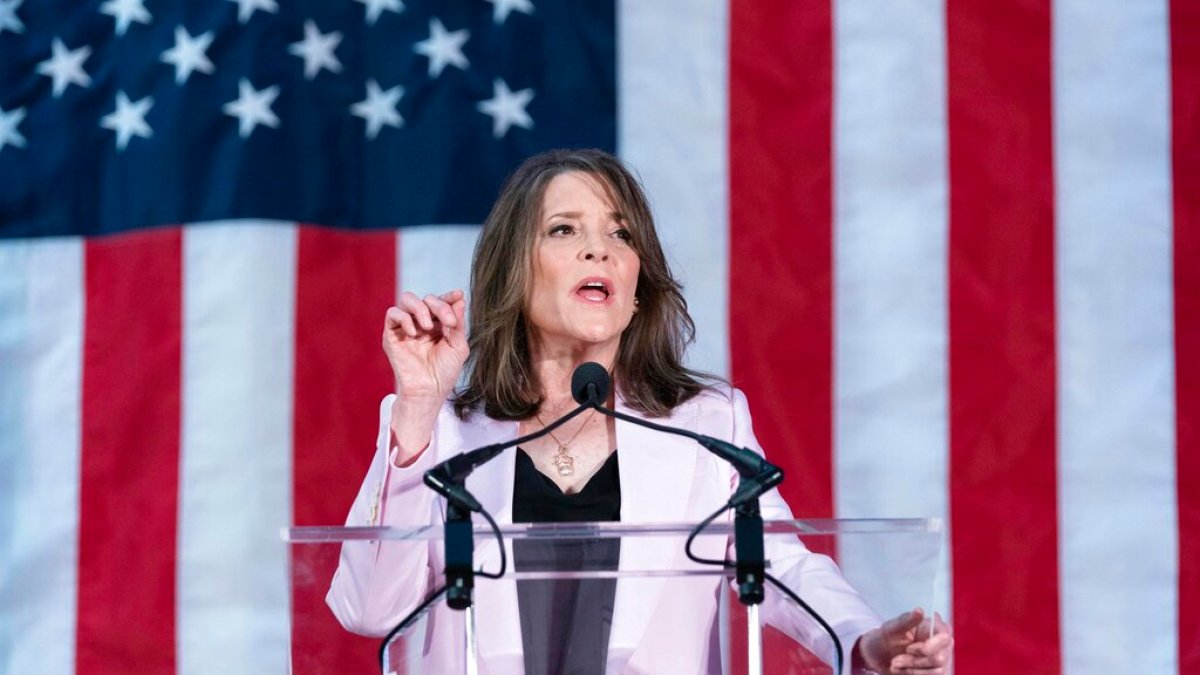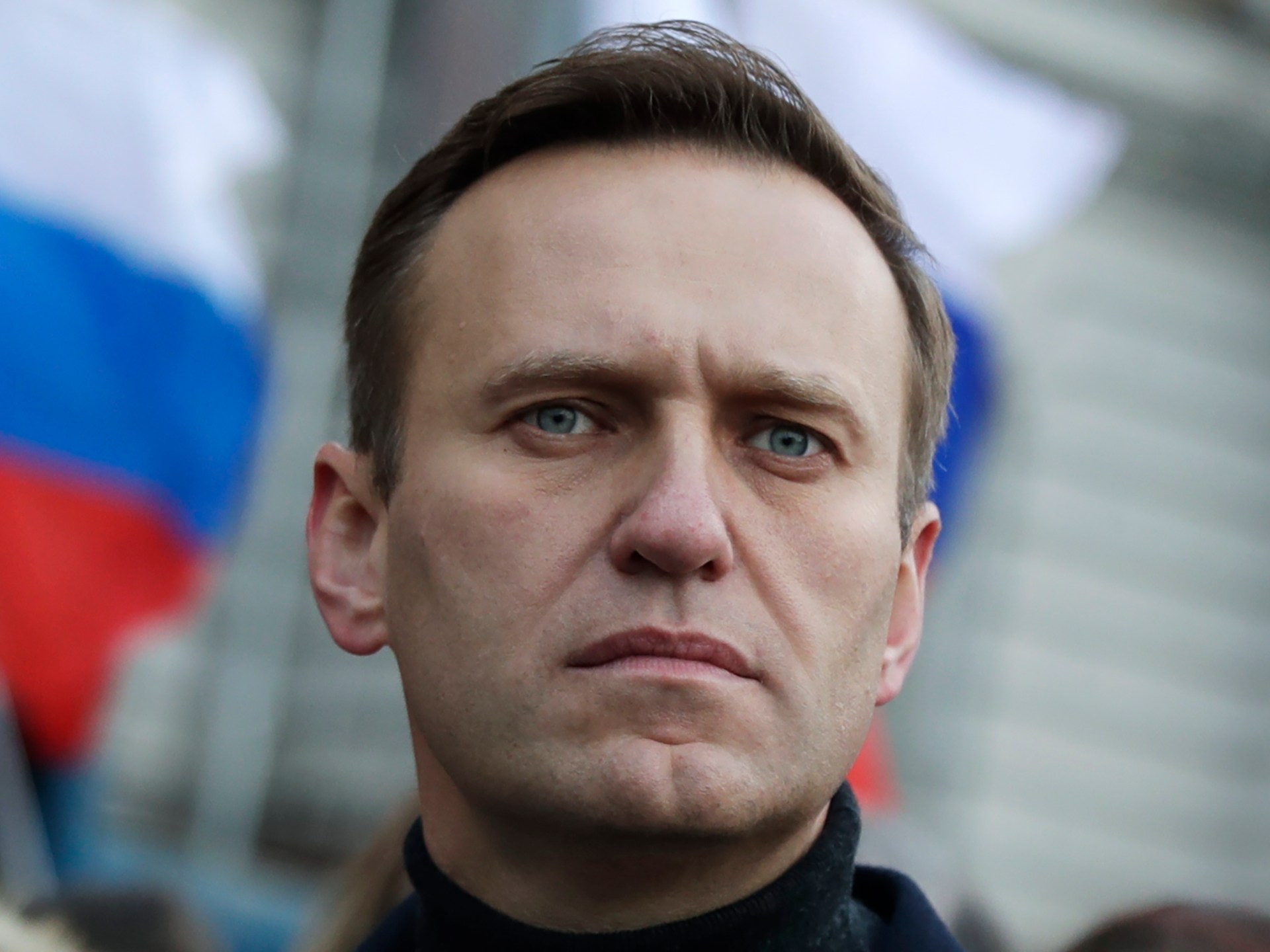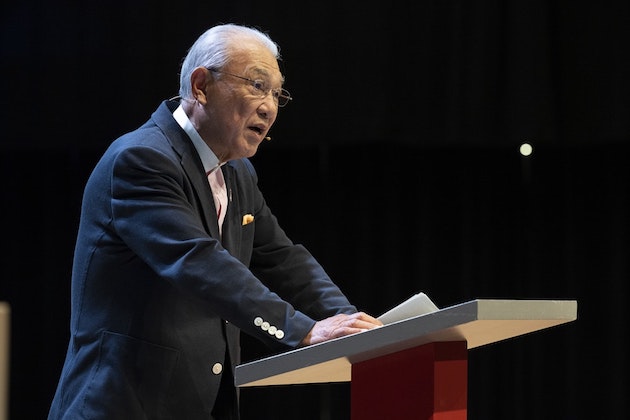Marianne Williamson on her US presidential campaign, the economy and Gaza | Elections News
Washington, DC – Marianne Williamson says she is not merely running a protest campaign.
A spiritual author who is challenging President Joe Biden for the Democratic nomination in the 2024 presidential race, Williamson believes someone needs to stand up to the growing corporate influences in the United States government.
“And I’m not the kind of woman who keeps my mouth shut,” Williamson told Al Jazeera from her apartment in Washington, DC, earlier this month.
Only once in US history has an elected president not received his party’s nomination for a second term. That makes Williamson’s campaign a long shot. But she remains undeterred. Her campaign is one of two Democratic challenges seeking to thwart Biden’s nomination, amid drooping poll numbers for the incumbent president.
While the other Democratic contender, Dean Phillips, is running from a centrist platform, Williamson hopes to rally progressives, a growing force in the party.
With her voice rising at times in indignation, Williamson decried how corporate greed was shifting the country — and the Democratic Party — away from their long-held ideals.
“We are at a point now where short-term profit maximisation for huge corporate entities has become America’s bottom line,” she said.
“And that corporatist perspective supersedes democratic values, humanitarian values and the safety and the health and the wellbeing of the American people.”
A progressive challenger
Her 2024 platform echoes many of the Democratic priorities articulated by Senator Bernie Sanders, one of the country’s most recognisable progressive voices.
He ran for president twice, in the 2016 and 2020 races, facing Williamson herself in the latter. She eventually dropped out, endorsing Sanders instead.
Williamson rose to fame in the early 1990s with her best-selling book A Return to Love and appearances on a TV talk show hosted by Oprah Winfrey. Later, in 2014, she unsuccessfully ran for Congress as an independent in California.
But with her presidential platform, she hopes to push further than Sanders did on several policy issues.
For example, Williamson backs a universal healthcare system, but her plan emphasises the need for healthier food, water and air and a less stressful lifestyle, saying that the current economic system increases “the probability of sickness”.
The candidate also wants to create a Department of Peace to suppress violence and address its root causes domestically and internationally.
Williamson’s almost holistic policy approach is underscored by her soft-spoken, guru-like persona. The author’s spirituality has led some to dismiss her candidacy as unserious. She went viral, for example, after saying in a 2019 primary debate that she would “harness love” to beat then-President Donald Trump and his campaign of “fear”.
Williamson is not unaware of that reputation. She acknowledges that she made “silly” statements at the debate that she credits to being “nervous”.
However, Williamson said there was a deliberate push to cast her aside in the 2020 race — a campaign that she said has intensified this time around.
“This time, it’s a full-on assault: mischaracterisation of my personality, of what I’ve done with my life for the last 40 years. This is strategised. This is purposeful,” she told Al Jazeera.
Shortly after Williamson announced her candidacy in March, Politico published an article citing anonymous former staffers who described the candidate as “abusive”. She dismissed the story at the time as a “hit piece” and refuted its details.
And on Wednesday, Williamson’s campaign faced another setback when the Massachusetts Democratic Party submitted only Biden’s name for the state’s primary ballot, effectively excluding her from the list of Democratic candidates.
‘There is no wiggle room’
Still, Williamson has drawn some, albeit limited, momentum. A Quinnipiac University poll last month showed her polling at 12 percent, far behind Biden at 74 percent.
The progressive monthly The Nation, however, noted last month that the polling gap between Williamson and Biden is similar to the margin between Republican rivals Trump and Nikki Haley — though less attention is being paid to the Democratic race.
While the gap is nevertheless huge, Williamson argues that she deserves more media attention, especially with some polls showing Biden trailing Trump in the general elections.
For his part, Biden has waved aside the polling data. “Everybody running for reelection in this time has been in the same position. There’s nothing new about that,” he said when asked about his low approval ratings earlier this year.
Instead, Biden and his allies have hoped to redirect attention to the US economy, which is showing faster-than-expected growth, low unemployment and inflation slowly coming under control.
But Williamson said the oft-cited economic data does not tell the whole story. For example, she pointed to a recent study showing that 62 percent of Americans live paycheck to paycheck.
She also stressed the high cost of living many Americans face, which she said is due to cyclical inflation as well as corporate price-gouging.
“For millions of people, it could be the difference whether or not you keep your apartment,” Williamson said. “So for the majority of Americans, there is no wiggle room.”
On Gaza
Democratic voters are also split over the Biden administration’s support for the war in Gaza. Biden has expressed “unwavering support” to Israel, promising to provide it with billions of dollars of additional aid despite humanitarian concerns over its military campaign.
The Israeli offensive has killed more than 20,000 Palestinians, and Israel’s leaders have pledged to continue the war until Hamas is eliminated. The Palestinian group had attacked Israel on October 7, killing 1,200 Israelis and taking hundreds more captive.
The White House and Pentagon have said repeatedly that they are not drawing any “red lines” to limit what Israel can do with US aid. Biden, meanwhile, continues to dismiss growing calls for a ceasefire.
For her part, Williamson has called for an end to the fighting, the release of the Israeli captives and an international push for a broader resolution of the Palestinian-Israeli conflict.
“I understand Israel’s need to slay the monster. But this military action is only feeding it,” Williamson said. “There was never a military solution here. And there is not a military solution now.”
Williamson added that while there is “no minimisation of the horror and the barbarism and the pure evil of October 7”, Palestinians have been suffering from Israeli occupation, settlement expansion and blockades around their territory.
“I don’t see any solution here but a ceasefire, a release of hostages, architecture for a two-state solution immediately,” she told Al Jazeera. “The death of a Palestinian child is no less horrifying than the death of an Israeli child.”
Williamson’s position reflects the views of a majority of Democrats. A December poll from the New York Times and Siena College found 64 percent of Democratic voters felt Israel should stop its military campaign to prevent civilian casualties, even if Hamas had not been “eliminated”.
But Williamson blames outdated worldviews for policymakers’ opposition to a ceasefire.
“The president is stuck in the 20th century — not just on this, but on many things. And that’s the problem here,” she said.
Biden has been a staunch supporter of Israel throughout his decades-long political career, which stretches back to the 1970s — a time when the country was seen as an essential US ally in the Middle East during the Cold War.
In fact, the president has repeated the same pro-Israel statements verbatim for the past 40 years.
That stance has led many Arab and Muslim Americans to pledge not to vote for Biden in the upcoming election because of his support for the war. So what is Williamson’s message to those voters?
“I have a very difficult time saying anyone should vote for me,” she said. “People should vote their conscience. People should listen to what the candidates have to say, consider deeply within their own hearts and minds what they think is best for their country and the world, and then should vote accordingly.”
Asked about the US vetoing a United Nations Security Council resolution that called for a ceasefire and the captives’ release, Williamson said: “Shameful. Shameful.”
The Democratic primaries kick off on January 23 in New Hampshire.
Check out our Latest News and Follow us at Facebook
Original Source






